The survey asked about possible reasons why there are more men than women in high political offices.

Of the eight reasons we asked about, only one – women having to do more to prove themselves than men – is seen as a major reason by a majority of Americans (54%).
More than four-in-ten point to gender discrimination (47%), women getting less support from party leaders (47%), many Americans not being ready to elect a woman to higher office (46%), and family responsibilities (44%) as major obstacles for women in politics.
Some 37% see sexual harassment as a major obstacle for women seeking high political office. About a third (34%) say women aren’t encouraged to be leaders from an early age and 23% say not as many women are interested in holding higher office.
How views have changed
Since we last asked this question in 2018, smaller shares now say the following are major reasons why there are fewer women than men in high political offices:
- Women aren’t encouraged to be leaders from an early age (-8 percentage points)
- Women who run for office have to do more to prove themselves than men (-7 points)
- Women get less support from party leaders (-5 points)
- Not as many women are interested in holding higher office (-4 points)
In contrast, a larger share now point to family responsibilities: 44% now say this is a major reason why there are fewer women than men in higher offices, compared with 36% five years ago. Views on the other items are unchanged from 2018.
By gender
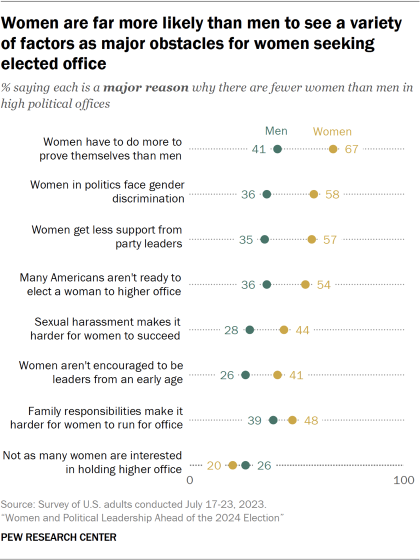
Women are more likely than men to see almost all the reasons we asked about as major obstacles for women in politics. In fact, there are differences of 10 percentage points or more on six of the eight items.
Men are more likely than women to point to women being less interested in holding political office as a major reason why there are fewer women than men in these positions.
By partisanship
There are wide partisan differences in views of the obstacles for women in politics.

Majorities of Democrats and Democratic leaners say each of the following is a major reason why there are fewer women than men in high political offices:
- Women have to do more to prove themselves than men (72%)
- Women in politics face gender discrimination (67%)
- Women get less support from party leaders (62%)
- Many Americans aren’t ready to elect a woman to higher office (58%)
The shares of Republicans and Republican leaners who see each of the items noted above as major obstacles range from 26% to 36%.
Democrats are also more likely than Republicans to point to sexual harassment and women not being encouraged to pursue leadership positions from an early age as major reasons why there are fewer women than men in high elected offices.
In turn, Republicans are about twice as likely as Democrats to cite women being less interested in holding higher office as a major reason (31% vs. 16%).
Democratic women are the most likely – and Republican men are the least likely – to see nearly every item we asked about as a major obstacle for women seeking high elected offices. But similar shares of Democratic and Republican women (about half of each) see family responsibilities as a major reason why there aren’t more women in these positions, compared with 41% of Republican men and 37% of Democratic men.
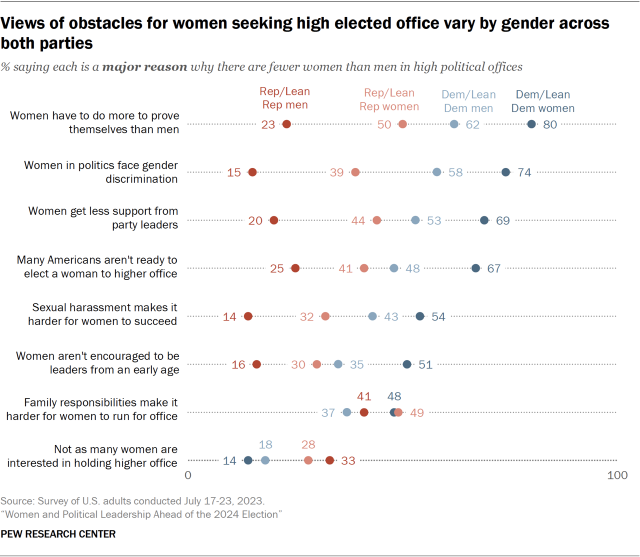
Views of how the media treat men and women running for high political office
The public sees differences in the way men and women running for high political office are treated by the media.
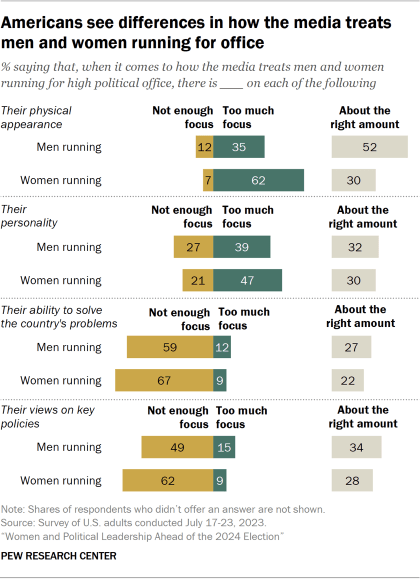
These differences are especially wide when it comes to how much the media focuses on candidates’ physical appearance and their views on key policies.
- Most Americans (62%) say there is too much focus on the physical appearance of women running for high elected office. About a third (35%) say this is the case when it comes to men running for these positions.
- 62% say there is not enough focuson women candidates’ views on key policies, compared with 49% who say the same about how the media treats men running for high political office.
Differences are less pronounced but still significant when it comes to views of how much the media focuses on men’s and women’s personality and their ability to solve the country’s problems.
- Majorities say there is not enough media focus on candidates’ ability to solve the country’s problems, whether the candidate is a man or a woman. But more say this is the case for women than for men running for high elected office (67% vs. 59%).
- Some 47% say there is too much focus on the personality of women running for high political office. A smaller share (39%) say the same about how the media treats men running for these positions.
Traits people think help or hurt men and women running for office
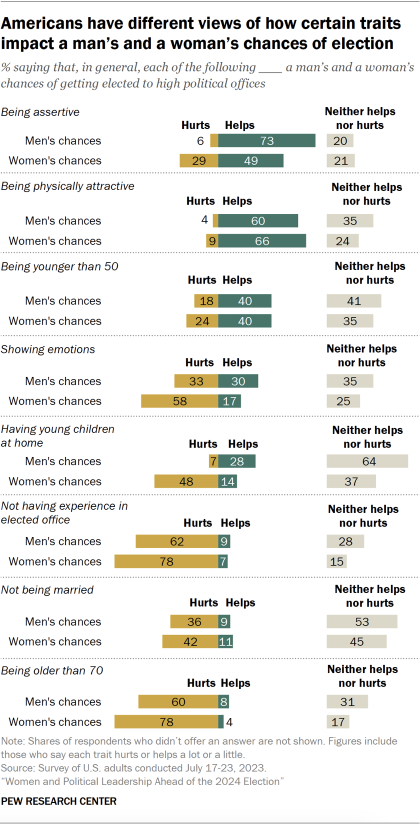
The survey asked how certain traits impact a man’s or a woman’s chances of getting elected to high political offices.
Majorities say not having experience in elected office and being older than 70 hurts men’s and women’s chances a lot or a little, but more see a negative impact for women. About 80% say each of these traits hurts a woman’s chances of getting elected, compared with about 60% who say these traits hurt a man’s chances.
By wide margins, more also say the following traits hurt a woman’s chances of being elected than say they hurt a man’s chances:
- Showing emotions: 58% say this hurts a woman’s chances, compared with 33% who say it hurts a man’s chances of being elected.
- Having young children at home: 48% say this hurts a woman’s chances of being elected, while just 7% say it has a similar impact on a man’s chances. In fact, 28% say having children at home helps a man’s chances of getting elected, compared with 14% who say this helps women running for office.
- Being assertive: More say being assertive helps than say it hurts both men and women running for office. But while 73% say this trait helps men, fewer (49%) say it helps women. Some 29% say being assertive hurts a woman’s chances of getting elected, compared with 6% who say it hurts a man’s chances.
Being physically attractive is the only trait we asked about that is seen by majorities as having a positive impact on both a man’s and a woman’s chances. But more say being physically attractive helps women than say it helps men running for office (66% vs. 60%).
Views of how a candidate’s gender, race and ethnicity impact their chances of election
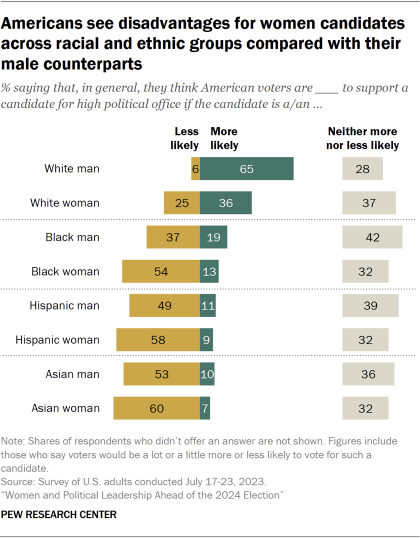
We asked Americans if they think voters are more likely, less likely, or neither more nor less likely to support a candidate for high political office depending on the candidate’s gender, race and ethnicity.
About two-thirds (65%) think American voters are more likely to vote for a candidate if the candidate is a White man.
A much smaller share (36%) say voters would be more likely to vote for a White woman. Still, more see being a White woman as an advantage than as a disadvantage for someone running for office (25% think voters would be less likely to vote for a candidate who was a White woman and 37% say voters would be neither more nor less likely to vote for a White woman).
In contrast, more see being a Black man or woman, a Hispanic man or woman, or an Asian man or woman as a disadvantage than see it as an advantage for someone running for high elected office.
In each case, women are seen as having a bigger disadvantage than men in the same racial or ethnic group. For example, 54% think American voters are less likely to vote for a candidate who is a Black woman, compared with 37% who say voters are less likely to vote for a Black man.
The same pattern exists to varying degrees for Hispanic or Asian candidates: In each case, a greater share of Americans say voters are less likely to support a woman than a man.


 Fact Sheet: Data on Women Leaders
Fact Sheet: Data on Women Leaders